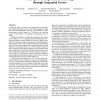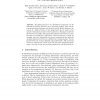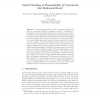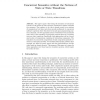1491 search results - page 46 / 299 » Resource-Passing Concurrent Programming |
154
click to vote
ASPLOS
2011
ACM
14 years 5 months ago
2011
ACM
Concurrency bugs are caused by non-deterministic interleavings between shared memory accesses. Their effects propagate through data and control dependences until they cause softwa...
122
click to vote
MICRO
2010
IEEE
15 years 5 days ago
2010
IEEE
Abstract--Parallel programming is hard, because it is impractical to test all possible thread interleavings. One promising approach to improve a multi-threaded program's relia...
CONCURRENCY
2008
15 years 2 months ago
2008
Abstract. The global quiescence of a distributed computation (or distributed termination detection) is an important problem. Some concurrent programming languages and systems provi...
141
click to vote
CAV
2010
Springer
15 years 6 months ago
2010
Springer
Abstract. Concurrent data structures with fine-grained synchronization are notoriously difficult to implement correctly. The difficulty of reasoning about these implementations do...
126
click to vote
FORMATS
2006
Springer
15 years 6 months ago
2006
Springer
This paper argues that basing the semantics of concurrent systems on the notions of state and state transitions is neither advisable nor necessary. The tendency to do this is deepl...




